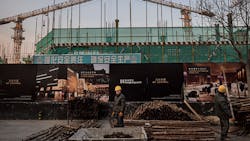China Gauge Shows Manufacturing Activity Still Shrinking
BEIJING — China’s manufacturing activity contracted at a slower pace in May, an HSBC survey showed Thursday, but companies cut back production and jobs despite government attempts to reinvigorate the world’s second-largest economy.
The preliminary reading for the British banking giant’s purchasing managers’ index (PMI) came in at 49.1 for this month, improving from a final figure of 48.9 in April, it said in a statement.
The index, compiled by information services provider Markit, tracks activity in China’s factories and workshops and is regarded as a barometer of the health of the Asian economic giant. Thursday’s figure marks the third consecutive month the index has been below the 50 point mark that separates contraction from growth.
The production sub-index fell for the first time this year, underlining deteriorating operating conditions, Annabel Fiddes, an economist at Markit, said in the statement.
“Softer client demand, both at home and abroad, along with further job cuts indicate that the sector may find it difficult to expand, at least in the near term, as companies tempered production plans in line with weaker demand conditions,” she said.
The government has “plenty of scope” to impose further stimulus as deflationary pressures remained “relatively strong”, she added.
China’s gross domestic product expanded 7.4% last year, the slowest since 1990. Growth weakened further to 7.0% in the January-March period, the worst quarterly result in six years.
The frailty looks to have extended into the second quarter after indicators for April’s activity such as trade and industrial output came in weaker than expected.
Authorities have taken a series of steps to stimulate the economy, including three interest rate cuts since November and two reductions in the amount of cash banks must keep in reserve, in a bid to boost lending.
This week the country’s top economic planning agency announced the approval of the construction of six railways expected to cost more than $40.8 billion.
Julian Evans-Pritchard, an economist with research firm Capital Economics, said the improvement in this month’s PMI could be attributed to a pick-up in new orders on the back of Beijing’s policy easing.
“The rebound in domestic demand hinted at by the PMI’s breakdown does suggest that recent policy efforts may finally be having their intended effect of shoring up short-run economic activity,” he wrote in a note.
Copyright Agence France-Presse, 2015
About the Author
Agence France-Presse
Copyright Agence France-Presse, 2002-2025. AFP text, photos, graphics and logos shall not be reproduced, published, broadcast, rewritten for broadcast or publication or redistributed directly or indirectly in any medium. AFP shall not be held liable for any delays, inaccuracies, errors or omissions in any AFP content, or for any actions taken in consequence.
